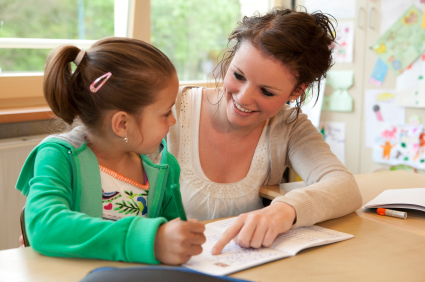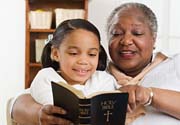 For several years now, our family has been trying to use the Bible as our primary textbook. We were first inspired to do so when we noticed that the book of Deuteronomy has a multitude of references to children and how to teach them, especially when we read how God taught His children, the children of Israel.
For several years now, our family has been trying to use the Bible as our primary textbook. We were first inspired to do so when we noticed that the book of Deuteronomy has a multitude of references to children and how to teach them, especially when we read how God taught His children, the children of Israel.
2 Timothy 3:16-17 says, “All Scripture is breathed out by God and profitable for teaching, for reproof, for correction, and for training in righteousness, that the man of God may be complete, equipped for every good work” (ESV). This verse exactly defined our goals for homeschooling, so we determined to try to put the Bible to the test.
Homeschooling can get as fancy as we want it to be, and there are a lot of good reasons why we might want to have packaged curriculum to wake up to each morning. But if we wanted to use the Bible as our main textbook, how could we go about it?
Read the Bible Together
The simplest way to use the Bible as your textbook is to just sit down and read it together each day. You could read a chapter a day after breakfast, discussing it as you go. Teach your children how to use Bible reference materials, such as E-Sword and Bible Hub, to research topics that catch your interest. Young children might enjoy coloring pictures and doing puzzles, such as those available at Calvary Curriculum and One Torah for All.
Each week, choose a memory verse to learn together as a family. Over the months, you could memorize entire chapters, sections of Proverbs, or verses about character traits or doctrinal topics. Marlin Hoffman has written a short guide called “You Can Memorize God’s Word.”
Finally, spend time praying together before you go about the rest of your day. This not only teaches your children how to communicate properly with their Heavenly Father; it also builds family members and excitement about God’s love and care.
 Learn How to Read with the Bible
Learn How to Read with the Bible
“In the beginning God created the heavens and the earth” (Genesis 1:1).
The simplest way to learn to read with the Bible is just to sit for about half an hour a day with your child, with an open Bible on your lap and a small white board or pad of paper beside you. You can start anywhere in the Bible, but Genesis is a popular place. Begin to read with and to your child. Move your finger under the words. Teach him the sounds of the letters, a few every week.
For instance, as your finger points to i and n, show him how it says “in.” Tell him that the is a sight word. Show him how to break apart a large word like beginning: that be says “bee,” and that e says its name at the end of a syllable like thing. Sound out ginn in “beginning.” Teach him that the letters ing make one sound together. Continue on in this way, day by day, and soon your child will figure out the code that is our language.
Continue to reinforce phonics and reading skills by having your child learn to write by copying the Bible each day. You’ll start by teaching handwriting, and soon you’ll progress to punctuation, word usage, spelling, and vocabulary. As your child gets older, have him work to write a complete copy of the Bible in his own handwriting before he graduates (Deuteronomy 17:18-19).
Have your child listen as you read a phrase of a verse out loud to him. Repeat it, then ask him to write it. Check it for errors by looking at it in the Bible. As your child improves in his listening skills, lengthen the amount you dictate to him each day.
Learn About Language from the Bible
Since God is the creator of languages (Genesis 11), you can teach your child how to learn foreign languages by learning how to read and write the original languages of the Scriptures. You could make a full course out of this, but even if you just dabble, the principles of how languages work will help your child if he later wants to learn Spanish, French, or Chinese.
Of course, the Bible is invaluable for learning the grammar of the English language, too. Study grammar you can identify the part of speech of every word in a Bible verse, and diagram it, too. You could work on one verse a day, then later do only one verse a week as a review. We teach grammar like this here at Homeschooling Torah.
 Learn to Communicate from the Bible
Learn to Communicate from the Bible
Learning to write and speak effectively is a major goal for a family that wants to train its children to fulfill the Great Commission (Matthew 28:19-20). Once your children have the ability to write, have them write a short essay each day on what they have learned from their Scripture copying. What is God teaching them? How can they apply it? Who might disagree, and how could they defend what the Bible says? How could they use this truth when they are an adult?
Learn about Creation from the Bible
The study of God’s creation is usually known as history and science.
For history, first be sure that your children know well the history of God’s chosen people, Israel, as given in the Old and New Testaments. You can add in other people groups of ancient times by studying the book of Daniel. The books of Matthew and Acts give much history of the early church, which you could also supplement by reading the actual writings of the early church fathers with websites such as Livius and Moellerhaus. Author Christine Miller (Nothing New Press) has written many helpful books, including All Through the Ages, which lists books by time period and subject. We use her books in our history curriculum here at Homeschooling Torah.
For science, study through the creation account in Genesis 1, word by word and phrase by phrase. You can then use the multitude of websites available online, as well as books from your local library, to learn about science topics as they come up. We approach science in this way here at Homeschooling Torah.
 Learn to Be a Skilled Workman from the Bible
Learn to Be a Skilled Workman from the Bible
Math and practical living skills are all that remain.
The important thing is to drill facts (addition, subtraction, multiplication, and division) until your child knows them automatically. Give lots of story problems from the Bible, and apply math to daily living as much as possible. This fits how God says we are to teach our children:
“You shall teach them diligently to your children, and shall talk of them when you sit in your house, and when you walk by the way, and when you lie down, and when you rise. You shall bind them as a sign on your hand, and they shall be as frontlets between your eyes. You shall write them on the doorposts of your house and on your gates” (Deuteronomy 6:7-9, ESV).
Math isn’t the only subject we’re suppose to teach like this. As the previous verse states, we are to teach all of the commands of God to our children, after first making sure they are written on our own hearts.
The study of God’s Word can make our children wise and equipped for every good work. His Word is a schoolmaster, leading our children to their Messiah and showing them how to walk a holy life each day. His Word, hidden in their hearts, can keep them from sin and can motivate them to give their entire lives over in service to the King of Kings. How privileged we are to have access to the best textbook of all!
Views: 4
 Learn How to Read with the Bible
Learn How to Read with the Bible Learn to Communicate from the Bible
Learn to Communicate from the Bible Learn to Be a Skilled Workman from the Bible
Learn to Be a Skilled Workman from the Bible